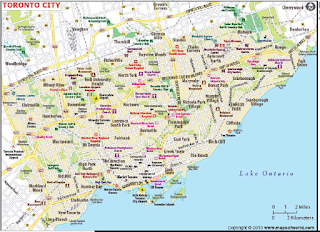Toronto and Montreal
--GEO 102- Ruihan Sun K00751001
Toronto and Montreal are two famous cities in Canada. The
geographical location of those two cities is close to each other, in the southern
of Canada. Also, both of them are large and
developed cities. But, on the other hand, the two cities have big difference in
their culture, life style, resource, architecture, and even languages.
Introduction of
Toronto (The city center is located in latitude 43°40′N, longitude 79°25′W)
Toronto, which is the capital of the province of
Ontario, is the largest city in Canada. It is located in the South of Ontario
and on the northwestern shore of Lake Ontario, covering an area of 630 square
kilometers. “In the 2011 measurements, the city had a population number of
2,615,060, making it the fifth greatest city in North America.” (Canada
Population 2018)
As the economic
center of Canada, Toronto is a world-class city and one of the largest
financial centers in the world, with a leading position in finance, business
services, telecommunications, aerospace, transportation, media, art, film,
television production, publishing, software, pharmaceutical research,
education, tourism and sports.
At the same time,
Toronto is one of the safest, richest cities in the world with high living
standards. Also, being known as the
Golden Horseshoe, Toronto is one of the most multicultural and cosmopolitan cities.
“Torontonians collectively speak over 140 languages. In fact, one in three
speaks a third language (not English or French) at home.”(National Geographic) Toronto, as a developed area, its unique
geographical conditions and history make it a significant position around the
world.
Toronto has four distinct seasons. Spring is short; summer
is hot and humid; autumn is mostly sunny with pleasant temperature; winter is
cold, and is extended until mid-April.
Located at the confluence of the Ottawa River and the St.
Lawrence River in Canada, Montreal is the second largest city in Canada, and
the largest city in Quebec with 4.1 million residents. Also, Montreal is the cultural and economic center of
the province of Quebec.
The St. Lawrence
River Waterway is 3,769-kilometer long, reaching the Great Lakes from the
Atlantic Ocean which lead to Montreal’s developed ocean shipping. Montreal is
rich in land with plenty of forest resources. Maple is the major breed of trees
in Montreal, due to the production of maple sugar; Maple becomes the logo of
Montreal and Quebec Province. Montreal is at the junction of several climatic
zones, so the weather is varied and the seasons are clear. The rainfall here is
very rich in Montreal, with an average annual rainfall of 897mm.
Montreal used to be the largest city in Canada in 1970s. As
a typical English-French bilingual city, it is Quebec's famous industrial, commercial,
financial center and the chief port. Because the city's Gothic churches and
majority French-speaking residents, it has unique French cultural heritage, and
is considered to be the "romantic capital" of North America.
Montreal is a prosperous international metropolis. Its
unique culture, beautiful city scenery and relaxed lifestyle have been rated as
one of the most suitable cities for human habitation in the world. Montreal's
traditional industry is crucial to the subsistence economy, with thousands of
factory of enterprises, clothing, tobacco, food, and wood. Other industries,
such as steel, rolling stock, machinery, chemistry, aircraft and electrical
appliances, are also advanced and developed. Also, Montreal is known as a ‘city
of designers’. “Montréal is definitely a “city of designers”: Over 25,000
professionals work in this lively field that is responsible for 34% of the
overall economic impact of the cultural sector.”(UNESCO
Fig 1 Toronto Map --Great Toronto area
Fig 2 Montreal Map
Fig 3 Montreal Map
Reference
Toronto, Wikipedia
Montreal, Wikipedia
STM: Transport Map of Montreal
Canada Population 2018: Population of
Toronto 2018, November 21, 2017
NYKA ALEXANDER, National Geographic: Toronto,
Creative cities Network: About the
Creative City




Comments
Post a Comment